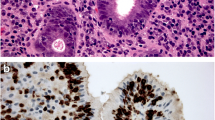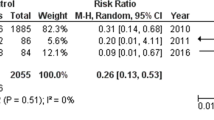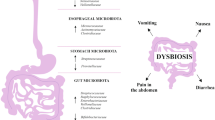Abstract
Helicobacter pylori (H. pylori) and NSAIDs are recognized as major pathogenic factors in peptic ulcer disease. However, whether these two factors exert synergistic or antagonistic effects on ulcer healing has not yet been fully explained. In this study, the effects of aspirin (ASA) alone and rofecoxib, a specific prostaglandin cyclooxygenase (COX)-2 inhibitor, were compared with that of ASA and rofecoxib applied in combination with H. pylori on gastric acid secretion and healing of acetic acid ulcers in rats. The H. pylori colonization of gastric mucosa was determined by viable bacterial culture and histology. The area of ulcers was determined by planimetry, the gastric blood flow (GBF) was measured using the H2-gas clearance method and the gastric mucosal generation of PGE2 and plasma gastrin levels were assessed by radioimmunoassay. ASA or rofecoxib applied alone delayed significantly the healing of chronic gastric ulcers and this effect was accompanied by a marked decrease in the GBF at the ulcer margin and gastric mucosal PGE2 generation without significant influence of gastric acid output. H. pylori that produced moderate gastric inflammation at the ulcer margin as confirmed by bacterial culture, prolonged significantly the healing of these ulcers and decreased the GBF at the ulcer margin and gastric acid output while elevating significantly the gastric mucosal PGE2 generation and plasma gastrin levels. H. pylori attenuated significantly the ASA- and rofecoxib-induced inhibition of ulcer healing and accompanying fall in the GBF at the ulcer margin and reversed, in part, the ASA- and rofecoxib-induced alterations in PGE2 generation. We conclude that H. pylori attenuates the delay in ulcer healing induced by ASA and rofecoxib due to enhancement in the generation of endogenous PGE2 and gastrin release, as well as suppression of acid secretion which may limit deleterious influence of NSAID on ulcer healing.
Similar content being viewed by others
REFERENCES
Bianchi Porro, G., Parente, F., Imbesi, V., et al. (1999). Role of Helicobacter in ulcer healing and recurrence of gastric and duodenal ulcers in long term NSAID users; response to omeprazole dual therapy, Gut 39, 22–26.
Brzozowski, T., Konturek, P. Ch., Konturek, S. J., et al. (1998). Gastric secretion and ulcer healing in mouse stomach infected with cytotoxin expressing strain of Helicobacter pylori, J. Physiol. Pharmacol. 49, 387–403.
Brzozowski, T., Konturek, P. Ch., Konturek, S. J., et al. (1999). Acceleration of ulcer healing by cholecystokinin (CCK): role of CCKA receptors, somatostatin, nitric oxide and sensory nerves, Regul. Pept. 82, 19–33.
Brzozowski, T., Konturek, P. C., Konturek, S. J., et al. (2001a). Effect of local application of growth factors on gastric ulcer healing and mucosal expression of cyclooxygenase-1and cyclooxygenase-2, Digestion 64, 15–29.
Brzozowski, T., Konturek, P. C., Konturek, S. J., et al. (2001b). Classic NSAID and selective cyclooxygenase (COX)-1 and COX-2 inhibitors in healing of chronic gastric ulcers, Microsc. Res. Tech. 53, 343–353.
Chan, F. K. L., Sung, J. J., Chung, S. C., et al. (1997). Randomized trial of eradication of H. pylori before non-steroidal anti-in' ammatory drug therapy to prevent peptic ulcers, Lancet 350, 975–979.
Chan F. K., Sung, J. J., Suen, R., et al. (1998). Does eradication of Helicobacter pylori impair healing of nonsteroidal anti-inflammatory drug associated bleeding peptic ulcers? A prospective randomized study, Aliment. Pharmacol. Ther. 12, 1201–1205.
Dixon, M. F., Genta R. M., Yardley, J. H., et al. (1996). Classification and grading of gastritis. The Updated Sydney SystemInternational Workshop on the histopathologyof Gastritis, Houston 1994, Am. J. Surg. Pathol. 20, 1161–1181.
Fendrick, A. M. and Scheiman, J. M. (2001). Helicobacter pylori and NSAID gastropathy: an am-biguous association, Curr. Rheumatol. Rep. 1 (3), 107–111.
Hawkey, C. J., Tulassay, Z., Szczepanski, L., et al. (1998). Randomized controlled trial of Helicobac-ter pylori eradication in patients on nonsteroidal anti-inflammatory drugs: The HELP NSAIDs study. Helicobacter Eradication for Lesion Prevention, Lancet 352, 1016–1021.
Hirose, H., Takeuchi, K. and Okabe, S. (1991). Effect of indomethacin on gastric mucosal blood flow around acetic acid-induced gastric ulcers in rats, Gastroenterology 100, 1259–1265.
Konturek, P. C., Brzozowski, T., Konturek, S. J., et al. (1997). Expression of epidermal growth factor and transforming growth factor alpha during ulcer healing, Scand. J. Gastroenterol. 32, 6–15.
Konturek, P. C., Brzozowski, T., Konturek, S. J., et al. (1998). Activation of genes for growth factors and cyclooxygenase in rat gastric mucosa during recovery from stress damage, Eur. J. Pharmacol. 342, 55–65.
Konturek, P. Ch., Brzozowski, T., Konturek, S. J., et al. (1999). Mouse model of Helicobacter pylori infection: studies of gastric function and ulcer healing, Aliment. Pharmacol. Ther. 13, 333–346.
Konturek, P. C., Brzozowski, T., Kwiecién, S, et al. (2002). Effect of Helicobacter pylori on delay in ulcer healing induced by ASA in rats, Eur. J. Pharmacol. 451, 191–202.
Konturek, S. J., Konturek, P. C., Plonka, A., et al. (2001). Implication of gastrin in cyclooxygenase-2 expression in Helicobacter pylori infected gastric ulceration, Prostaglandins Lipid Mediat. 66, 39–51.
Laine, L., Harper, T., Simon, T., et al. (1999). A randomized trial comparing the effect of rofecoxib, a cyclooxygenase 2-specific inhibitor, with that of ibuprofen on the gastroduodenal mucosa of patients with osteoarthritis, Gastroenterology 117, 776–783.
Li, H., Mellgard, B. and Helander, H. (1997). Inoculation of VacA-and CagA-Helicobacter pylori delays gastric ulcer healing in rat, Scand. J. Gastroenterol. 32, 439–444.
Li, H., Kalies, I., Mellegard, B., et al. (1998). A rat model of chronic Helicobacter infection. Studies on epithelial cell turnover and gastric ulcer healing, Scand. J. Gastroenterol. 33, 370–78.
Loeb, D. S., Talley, N. J., Alquist D. A., et al. (1992). Long term nonsteroidal anti-in' ammatory drug use and gastroduodenal injury: the role of Helicobacter pylori, Gastroenterologt 102, 1899–1905.
Mizuno, H., Sakamoto, Ch., Matsuda, K., et al. (1997). Induction of cyclooxygenase-2 in gastric mu-cosal lesions and its inhibition by the specific antagonist delays healing in mice, Gastroenterology 112, 387–397.
Okabe, S., Pfeiffer, C. J. and Roth, J. L. A. (1971). A method for experimental, penetrating gastric and duodenal ulcers in rats, Am. J. Dig. Dis. 16, 277–284.
Penney, A. G., Andrews, F. J. and O'Brien, P. E. (1994). Effects of misoprostol on delayed ulcer healing induced by ASA, Dig. Dis. Sci. 39, 934–939.
Szabo, S. and Vincze, A. (2000). Growth factors in ulcer healing: lessons from recent studies, J. Physiol. 94, 77–81.
Tarnawski, A. (1993). Cellular mechanism of gastric ulcer healing, in: The Stomach, W. Domschke and S. J. Konturek (Eds), pp. 177–192. Springer, Berlin.
Tytgat, G. N. J. (2000). Ulcers and gastritis, Endoscopy 32, 108–117.
Wang, J. Y., Yamasaki, S., Takeuchi, K., et al. (1989). Delayed healing of acetic acid-induced gastric ulcers in rats by indomethacin, Gastroenterology 96, 393–402.
Rights and permissions
About this article
Cite this article
Brzozowski, T., Konturek, P.C., Sliwowski, Z. et al. Helicobacter pylori attenuates the delay in ulcer healing induced by aspirin and selective COX-2 inhibitor. Inflammopharmacology 10, 423–433 (2002). https://doi.org/10.1163/156856002321544891
Issue Date:
DOI: https://doi.org/10.1163/156856002321544891




